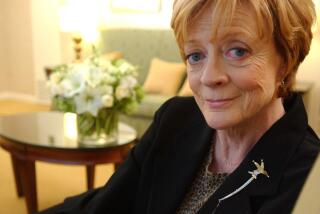‘Downton Abbey’ recap: How the other half lives
As anyone who’s ever been sucked into a “House Hunters” marathon understands, there are few things as universally appealing as spying on other people’s real estate -- especially when that real estate is, well, real estate like Downton Abbey.
The Crawleys open up their ginormous ancestral home to the public for one day only to raise funds for the hospital. The very idea is horrifying to the three most vocal defenders of the status quo, Violet, Grantham and especially Carson. He sees it as a needless invitation to thieves to slip a first edition in their pockets and a great way to incite class warfare. “Next thing you know, there’s a guillotine in Trafalgar Square,” he says.
Others, as usual, are more sensible. “Even Elizabeth Bennet wanted to see what Pemberley was like inside,” says Isobel, referring to the heroine of Jane Austen’s “Pride and Prejudice.”
With some help from Edith’s visiting beau, Bertie, the open house is a hit, even though hardly anyone in the family -- that is, outside of the librarian I never knew existed -- seems to know anything about the history of Downton Abbey. Cue a hilarious montage of Edith, Mary and Cora making it up as they go along. “They were all rather marvelous and sort of living that life.” “He built the houses of Parliament... or at least he finished them. He built lots of lovely, big buildings.” “The little girl is a little boy, but who I could not say.”
Grantham -- who’s not dead, it turns out, merely bedridden and off the hooch -- also gets an amusing, surprise visit from a wise little boy with a working-class accent. “Why’s it so big, your ‘ouse?” he asks. “Why not buy somewhere comfy? You must have enough money.”
“You know how it is,” Grantham replies wearily. “You like what you’re used to.”
The success of the open house prompts the umpteenth bout of rumination about the demise of the Downton Way of Life. As the family sits crowded in Lord Grantham’s bedroom -- certainly a cozier setting than usual -- Branson suggests opening the house, which “doesn’t make a penny towards washing its own face,” on a more regular basis. Grantham is appalled by the suggestion, while Edith is merely troubled by it. “It means our way of life is something strange,” she says.
Surely it’s no coincidence that both Crawley sisters are romantically interested in men who come from different class backgrounds and find themselves contemplating marriages that will look quite different from their parents’. Bertie’s an estate manager, while Henry Talbot’s an unusually attractive grease monkey.
Of the two sisters, Mary is obviously more troubled by the issue -- but clearly, it seems like just a matter of time before she gives in to Henry’s charms. Meanwhile, Edith is set to become “one of the interesting women of the day,” as her father puts it, and has been through too much romantic trauma to care much about Bertie’s income. Can you blame her? A bigger hurdle will be Marigold, though if Bertie’s as clever as he seems, he may put two and two together before Edith has to come clean. (Side note: That visit to the side nursery made me realize how odd it is that Julian Fellowes has never written the nannies into this show. Seems like that would be fascinating -- but I digress.)
Speaking of which: Fellowes really knows how to squander the drama, doesn’t he? At the end of last week’s episode, Lord Grantham was barely clinging to life. This week he’s suddenly back at Downton, with barely an explanation. Surely he might have dragged it out for another week, if only for a bit of suspense?
Carson and Hughes’ marriage is also turning into a missed opportunity. When the season began, I thought their relationship, what with all the awkward conversations about sex, might become an interesting and frank exploration of the challenges of late-in-life romance. Instead, it has descended into a sitcom-y battle of the sexes over Mrs. Hughes’ culinary skills.
Now I’m certainly not asking for Carson-Hughes love scenes -- I’m sure plenty of fan fiction writers have already taken care of that -- I am merely saying that it strikes me as odd, how Fellowes brought up the issue of their physical relationship, only to completely drop it after the honeymoon.
Instead, Carson has turned into an entitled, persnickety bore, grumbling about the corners on his bed and refusing to drink wine because “somehow it feels disloyal” to Lord Grantham. I appreciate that Fellowes is making a point about how thoroughly Carson’s identity is tied to Downton Abbey and in particular to its master, but surely we don’t need quite so much reminding. It’s time Carson started to consciously uncouple from Downton and start focusing on his wife.
In any case, he’s got much more to be happy about than poor old Thomas, whose job, as Carson puts it, “is fragrant with memories of a lost world and whose efforts to help Andy learn to read have backfired spectacularly. Could it be that Thomas, the one person who’s never really fit in at Downton, needs it more than anyone?
Envelope Screening Series: ‘Downton Abbey’

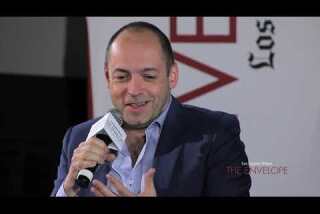
Screening Series: 'Downton Abbey': An unexpected home
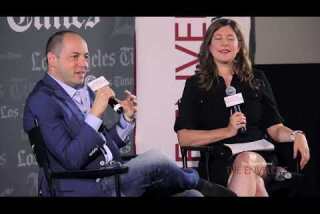
Screening Series: 'Downton Abbey': Kate Middleton on set
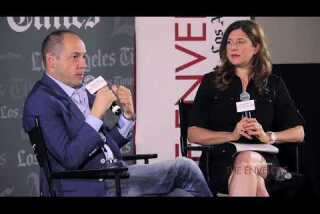
Screening Series: 'Downton Abbey': The cast
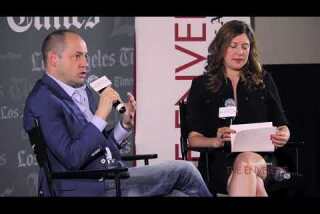
Screening Series: 'Downton Abbey': The future of the characters
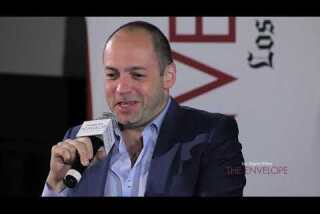
Screening Series: 'Downton Abbey' | The show is born
Follow @MeredithBlake on Twitter.
MORE:
Maggie Smith looks back at early typecasting. It isn’t what you think
Review: Maggie Smith brings a regal bearing to a bag lady role in ‘Lady in the Van’
More to Read
The complete guide to home viewing
Get Screen Gab for everything about the TV shows and streaming movies everyone’s talking about.
You may occasionally receive promotional content from the Los Angeles Times.

